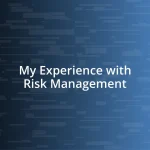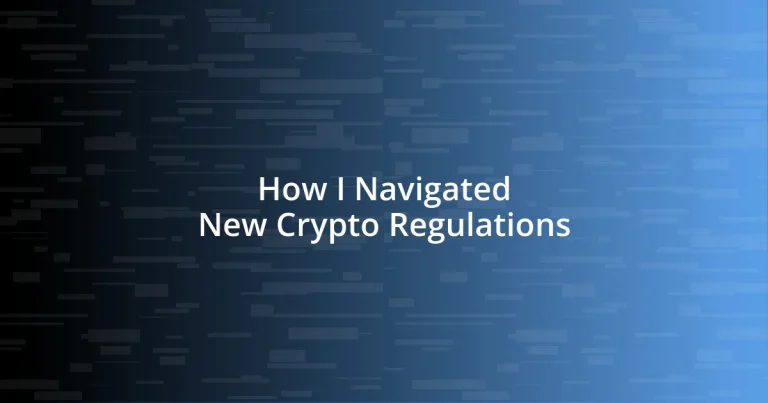Key takeaways:
- The introduction of stricter KYC requirements highlights the importance of preventing fraud and building trust in the crypto space.
- Utilizing compliance technology and forming partnerships with legal experts is essential for navigating regulatory complexities effectively.
- Future trends suggest a move towards global harmonization of regulations, with an emphasis on consumer protection and the integration of advanced technology in compliance processes.
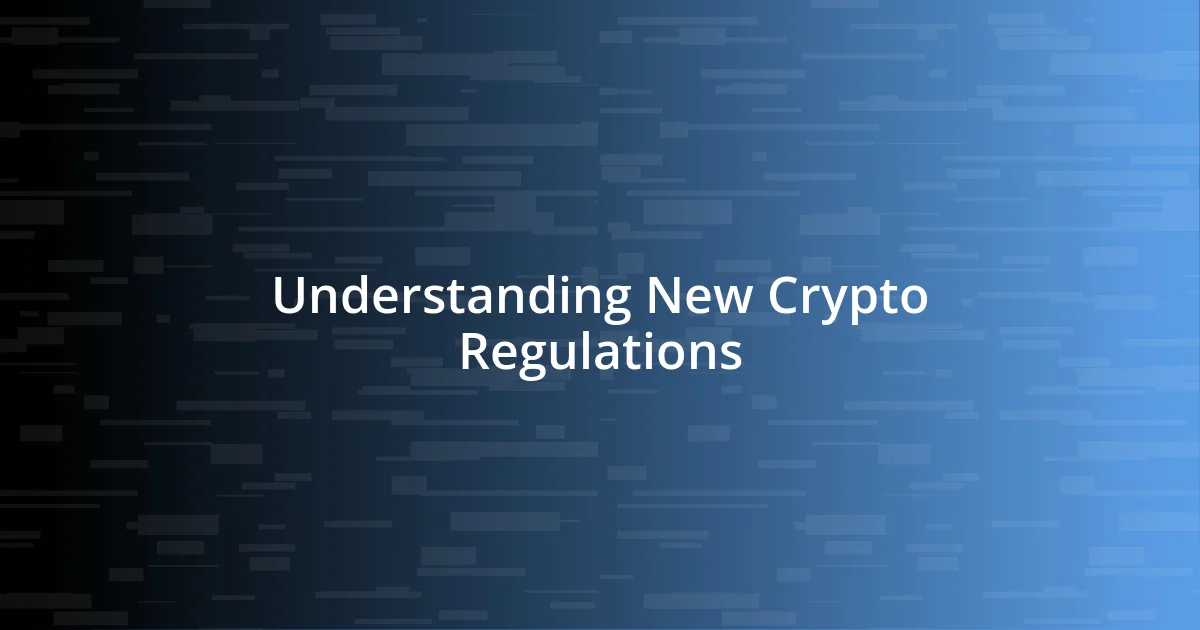
Understanding New Crypto Regulations
Navigating new crypto regulations can feel overwhelming, especially given how rapidly things are changing. I remember sitting down with a cup of coffee, staring at pages of legal jargon, and thinking, “How on earth am I supposed to make sense of all this?” The key, I found, was to break it down into smaller, digestible pieces instead of trying to tackle everything at once.
One aspect that struck me was the variation in regulations from one region to another. When I started exploring regulations in different countries, I felt this mix of frustration and excitement. On one hand, it was daunting to think I had to keep track of these differing laws; on the other hand, I realized it was an incredible opportunity to discover how each jurisdiction is trying to adapt to this new financial landscape. Have you ever noticed how innovation often runs parallel to regulation? It’s fascinating how these rules can incentivize or stifle creativity in the crypto world.
As I delved further into compliance requirements, I became acutely aware of the importance of transparency. I often found myself asking, “How can I ensure I’m following these guidelines without losing my vision?” This self-reflection helped me appreciate the balance between adhering to regulations and maintaining the innovative spirit that drew me to crypto in the first place. Recognizing that regulations are not just obstacles, but also frameworks that can guide our creativity, has truly changed my perspective.
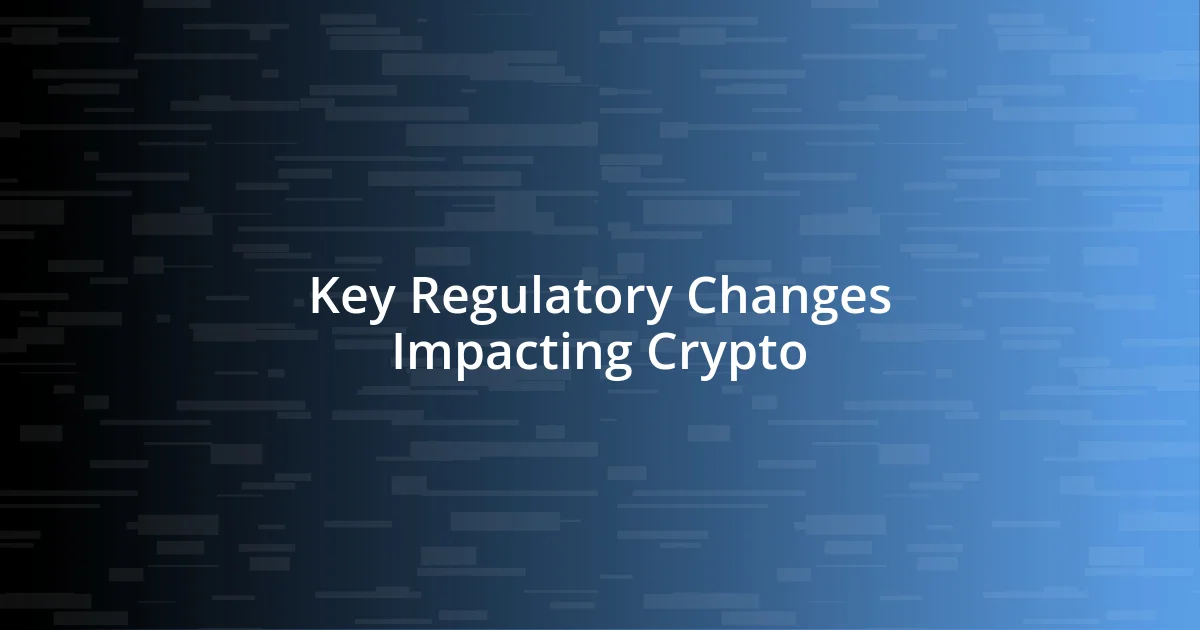
Key Regulatory Changes Impacting Crypto
One regulatory change that really caught my attention was the introduction of stricter Know Your Customer (KYC) requirements. The first time I faced an extensive KYC process, I felt a mix of anxiety and irritation. It was like showing up at a party where everyone knew each other, and I was the stranger being asked a million questions. But, as I dove deeper, I came to understand that these measures aren’t just inconvenience; they’re vital for preventing fraud and establishing trust in the crypto space.
Here are some key regulatory changes impacting crypto that I’ve found particularly significant:
- Enhanced KYC Requirements: Businesses must now verify customer identities more rigorously to prevent fraud and financial crime.
- Tax Reporting Obligations: Many jurisdictions are enforcing stricter guidelines on how capital gains from crypto transactions are reported.
- Stablecoin Regulation: Regulators are focusing on the issuance and reserves of stablecoins, aiming to protect consumers and enhance financial stability.
- Decentralized Finance (DeFi) Scrutiny: The rise of DeFi platforms has brought on questions regarding compliance, calling for clearer regulatory frameworks around lending and borrowing within these spaces.
Reflecting on these changes, I see both challenges and new doors opening. Initially, I felt overburdened by compliance, but as I adapted, I started to recognize opportunities to forge stronger relationships with customers. Embracing these regulations can feel like stepping into a new world, one where trust and accountability propel us forward together.
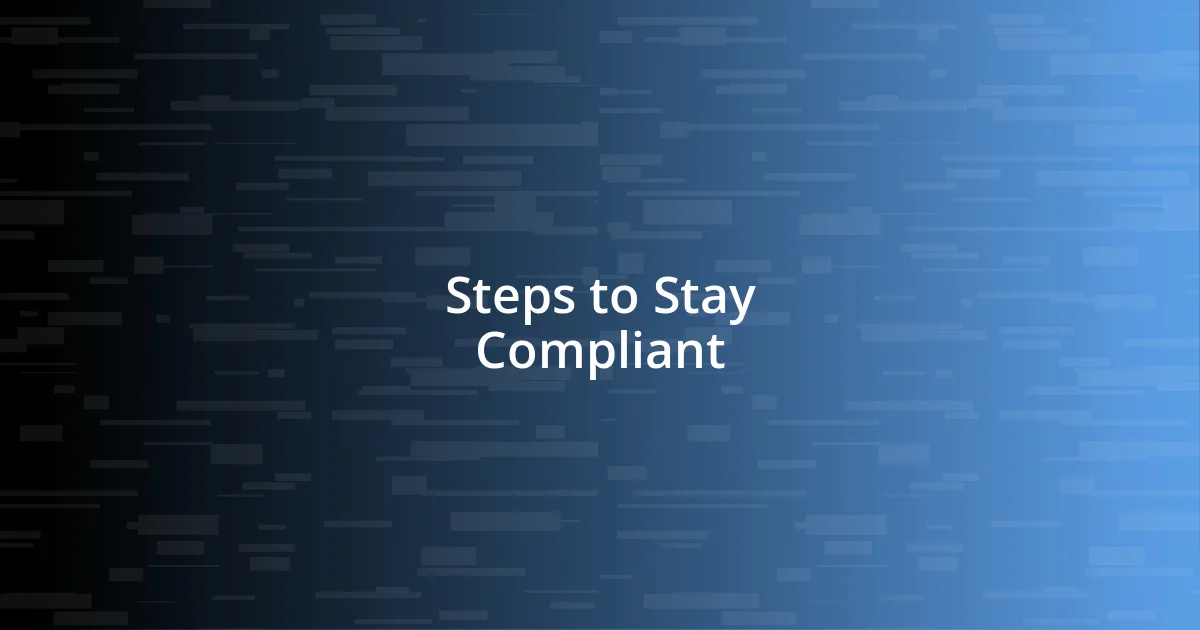
Steps to Stay Compliant
While staying compliant in the evolving crypto landscape can seem daunting, I found that methodical steps truly make a difference. First, I prioritized understanding the regulations in my specific jurisdiction. It became a sort of puzzle; each piece revealed how to align my operations with legal standards. I recall pouring over my first compliance checklist and feeling a sense of accomplishment as I checked off each item—I realized I was building a solid foundation for my business.
Next, I formed partnerships with legal experts who specialized in crypto regulations. Their insights were invaluable, and I remember a particular meeting where we broke down complex tax obligations into simple actionable steps. It felt as if I had gained a trusted guide in unfamiliar territory. Staying compliant isn’t just about following rules; it’s about building relationships with knowledgeable professionals who can help navigate the intricacies of the law.
Finally, I invested in compliance technology tools. Implementing software to manage transactions and monitor KYC requirements helped streamline my process tremendously. At first, it felt overwhelming to incorporate technology into my routine, but I soon discovered it saved me time and reduced the risk of errors. This blend of personal effort, professional advice, and tech enablement has made compliance not only achievable but genuinely rewarding.
| Step | Description |
|---|---|
| Understand Regulations | Study the specific laws in your jurisdiction to create a compliance checklist. |
| Engage Legal Experts | Form partnerships with specialists who can simplify complex regulations for you. |
| Utilize Compliance Tech | Invest in software that streamlines transaction management and KYC verification. |
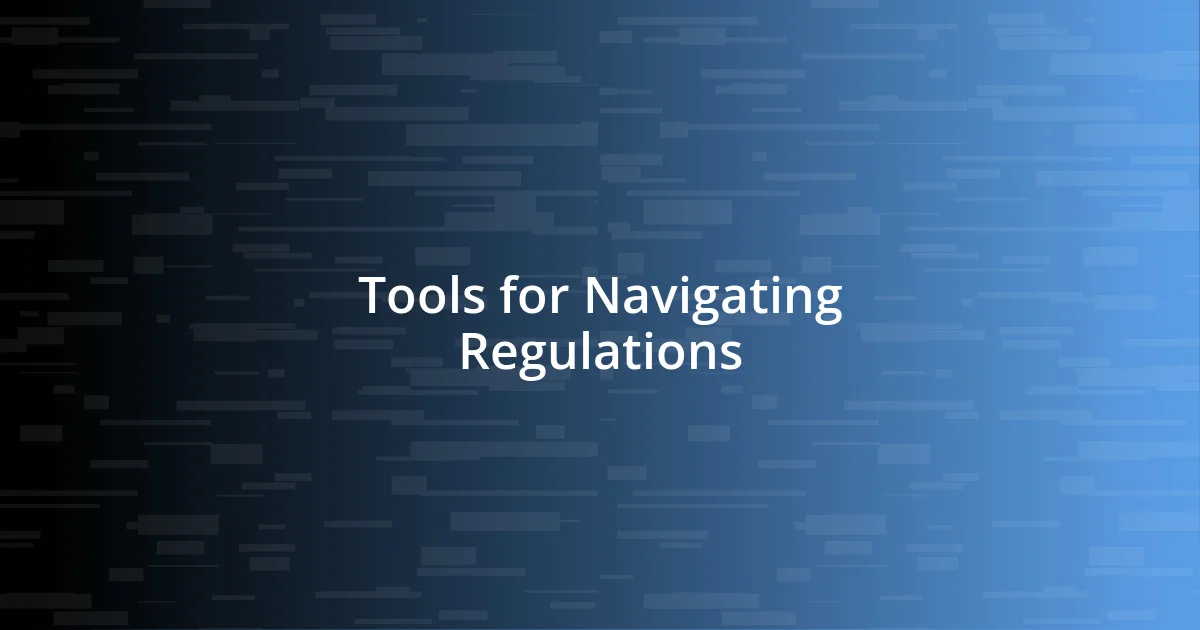
Tools for Navigating Regulations
When it comes to navigating the maze of regulatory changes, I’ve found that research tools play a crucial role. One of my favorites has been compliance software like Chainalysis, which not only ensures I meet KYC requirements but also offers real-time data analytics. I remember the first time I generated a compliance report—it felt empowering to see everything laid out so clearly, almost like having a detailed map in uncharted territory.
Additionally, I can’t stress enough the importance of community forums and online networks dedicated to crypto compliance. Engaging with fellow entrepreneurs, I often come across collective wisdom that nobody else can offer. I vividly recall a discussion about tax reporting strategies that saved me from a potential audit disaster. Have you ever felt that rush of relief when finding a solution just when you needed it? That’s the beauty of sharing experiences with a supportive community.
Lastly, I turned to regulatory agencies’ official websites for guidance. While at first I was intimidated by the legal jargon, I gradually learned to decipher government language. The day I found a direct answer to a specific question on a regulatory site, I felt a surge of confidence that motivated me to explore even further. It’s a reminder that sometimes, going straight to the source is the most reliable way to ensure you’re compliant.

Best Practices for Crypto Operations
Maintaining best practices in crypto operations is essential for success. I learned early on how vital it is to create and enforce strict internal protocols. For instance, I established a clear process for onboarding new clients, which not only includes thorough KYC checks but also a checklist that ensures every team member knows their responsibilities. Can you imagine the relief I felt when I realized that this proactive measure reduced our compliance issues significantly?
Another best practice that truly resonated with me is continuous education for the entire team. Everyone, from management to customer service, should understand the basics of crypto regulations. I recall hosting informal lunch-and-learn sessions, which turned out to be surprisingly engaging. There’s something powerful about a team that believes in shared knowledge—it fosters a culture of compliance and enhances our overall operation. Does your team engage in regular training sessions? It might be time to consider it.
Finally, documenting everything has become a mantra for my operations. Whether it’s recording decisions made during compliance reviews or keeping a log of regulatory changes, I found that meticulous records not only help in audits but also guide future decision-making. I once had a team member find a nuance in our documentation that alerted us to an upcoming regulatory change. That moment reaffirmed my belief that detailed records are not just paperwork; they’re a lifeline in a fluctuating industry.

Resources for Ongoing Education
I’ve discovered a wealth of resources that can deepen your understanding of ongoing crypto regulations. One of my go-to resources is webinars hosted by industry experts, which I find incredibly enlightening. The first time I tuned into one about emerging regulations, I felt like I was in a front-row seat at a concert—absorbing every note of crucial information and insights. Have you ever left a session buzzing with ideas, eager to implement what you’ve just learned? That thrill is a sign of real growth!
Podcasts are another fantastic way to stay updated. I remember listening to a series that broke down complex regulations into digestible conversations. It felt like having a chat with friends who just happened to be legal experts. I often find myself pausing the episodes to jot down key takeaways, which really cements the information in my mind. There’s something about hearing real-world applications of these regulations that makes them feel less abstract and more actionable, don’t you think?
Lastly, online courses can be game-changers for anyone serious about navigating these waters. I recently completed a course that delved into compliance strategies, and it opened my eyes to aspects of the regulations I hadn’t considered. The assignments felt practical, almost like crafting a personalized playbook for my business. As I aced the final project, I couldn’t help but feel a surge of confidence—like I had just leveled up in a video game. Investing time in these courses isn’t just about learning; it’s about empowering yourself to take charge in a rapidly changing landscape.
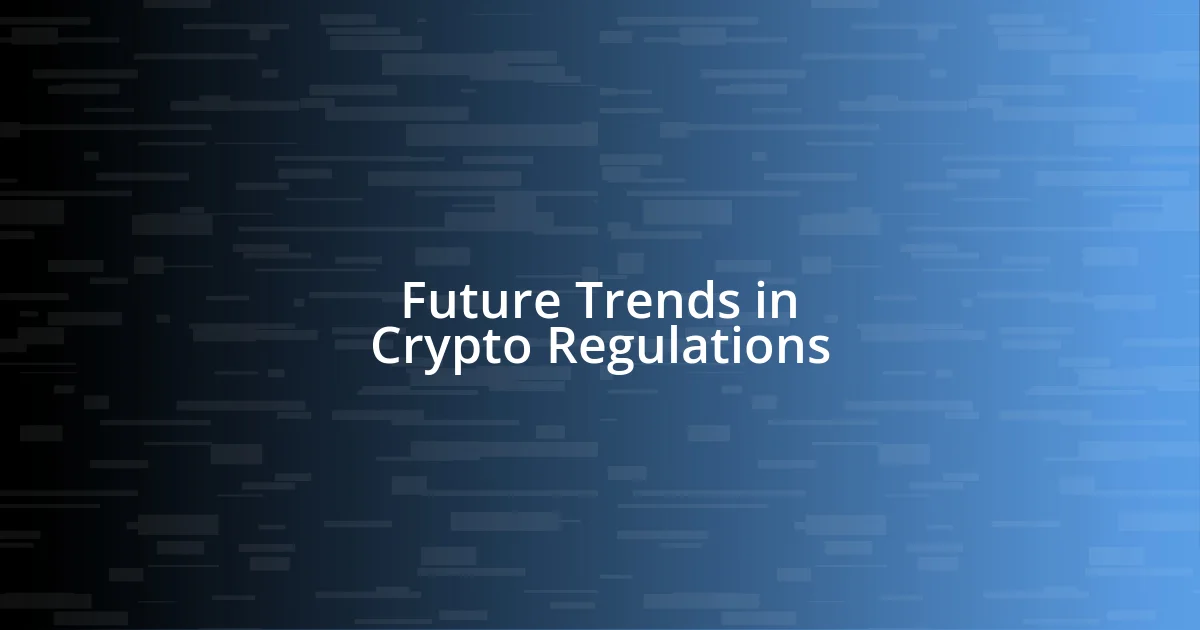
Future Trends in Crypto Regulations
As I look ahead, it’s evident that global harmonization of crypto regulations is on the horizon. Just the other day, I was reflecting on my experiences attending a recent summit where regulators from various countries discussed aligning their approaches. It was fascinating to see how different jurisdictions are eager to share best practices, ultimately streamlining compliance for companies like mine. Have you ever considered how much easier your life would be if regulations were consistent worldwide? I know I certainly have.
I also believe that technological advancements will heavily influence future regulations, particularly around blockchain analytics and real-time monitoring. During a chat with a tech-savvy friend, he mentioned how algorithms could soon detect suspicious activity almost instantly. This conversation got me thinking: what if these tools not only flagged issues but also offered corrective recommendations? It’s exciting to envision how technology could turn regulation from a cumbersome task into a proactive, almost intuitive process.
Moreover, I’m seeing a growing trend in consumer protection, especially as the market matures. I remember being approached by a client who was concerned about security and transparency in crypto transactions. That highlighted for me how essential it is for regulations to evolve to include greater consumer safeguards. If regulators prioritize these aspects, we’ll not only gain trust but also empower users to engage confidently in the crypto space. Isn’t it invigorating to think about how regulation can enhance our industry, rather than restrain it?









